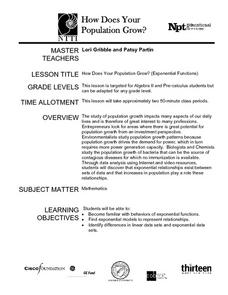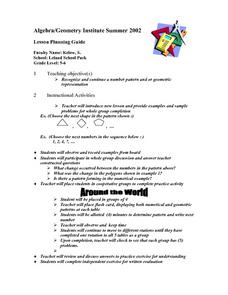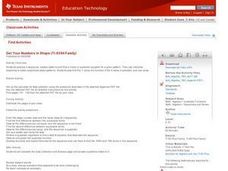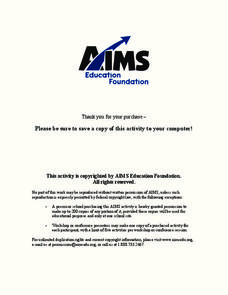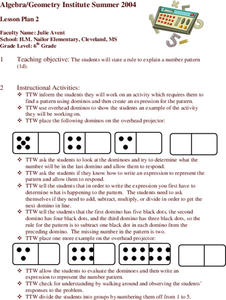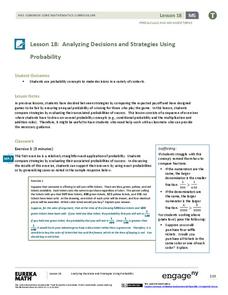Curated OER
Euclidean Direct Proofs
Learning how to prove theorems in geometry can be challenging. This resource explains what a proof is, and the different styles for proofs. It also contains links to web-based practice problems that help guide learners though example...
Curated OER
How Does Your Population Grown?
Do you know how the population has grown of your community? Can you predict the population over the next half century? Can we find an algebraic model that matches our data? These along with many more questions can be researched by...
Education World
High, Low, or In Between?
Trios play a card game that reinforces the concepts of number sequence and greater than and less than. Scholars make predictions based on information they know and a single unknown. They see cards drawn by others in the group, but not...
Curated OER
Everyday Mathematics: Multiples of 10
In this multiples of 10 worksheet, learners sharpen their math skills as they learn to use multiples of 10 to help them with division and then try the 2 extra practice activities.
Curated OER
WebQuest: Thrills and Spills- Pick Your Park!
Students participate in a WebQuest in which they must determine which amusement park is the "median priced" park. Students visit park websites to accumulate prices for parking, activities, restaurants, and gift shops.
Curated OER
Finding The Sum of an Infinite Series
Pupils examine finding the sum of an infinite series as the limit of partial sums. Through hands-on activities, students create their own sequence by finding the area of a square and then cutting it in half-sized pieces. They write out...
Curated OER
Patterns and Geometric Representations
Students explore patterns and sequences. Given an example of each, they discuss their observations. In groups, students participate in an "Around the World" activity where they rotate to different stations in the classroom to determine...
Curated OER
Get Your Numbers in Shape - TI-83
High Schoolers use the TI-83 calculator to produce a sequence, explore patterns and find a linear or quadratic equation for a given pattern. They use inductive reasoning to make conjectures about patterns. They find the Y-value of a...
Curated OER
Counting Chart
Elementary learners discover counting through a counting chart. In this math lesson, students identify numbers 1-100. They then point or recite their counting numbers.
Curated OER
Measure
Students are asked what activities or things that they do each day. They are then asked do you do that in the morning, afternoon, or night? Students are then asked which of those things do you do first, second, third, and etc.
Curated OER
Bears Wear Buttons
Students practice counting sets of objects and numerals. In this numerical identification lesson, students listen to the story, Bears Wears Buttons, and participate in a flash card activity where students must place buttons on...
Curated OER
Rooster's Night Out
Mitch Weiss and Martha Hamilton's Rooster's Night Out, a retelling of a classic Cuba folktale, launches a cross-curricular study of Cuban cultural traditions. Class members draw the characters from the book, participate in math and...
Curated OER
Number Patterns
Sixth graders study number patterns. They observe dominoes to determine the next domino in the sequence. After studying the dominoes, they write an expression to represent the pattern.
Curated OER
Advanced Algebra with the TI-89
Pupils investigate the formulas for volumes of various solids using the Ti-89 calculator. The lesson plan focuses on the keying sequences necessary to embed the required volume formula in a program which is then used in the problem...
Curated OER
Comprehension Through The Very Hungry Caterpillar
Students sequence seven events from "The Very Hungry Caterpillar" by matching the correct event with the day of the week. They recall details from the story as they unscramble words on a worksheet.
Curated OER
Spatial Relationships: an Over/Under Dance
Students explore the relationships of space through movement. Two perform movement improvisation based on over/under. The activity improves hand-eye coordination, cooperation, and communication skills. The timing of the dance also...
EngageNY
Algebraic Expressions—The Distributive Property
Do your classes truly understand the distributive property? Use a demonstrative lesson to represent the distributive property in various ways. Learners solidify understanding by creating a geometric pattern for distributive...
EngageNY
Equivalent Rational Expressions
Rational expressions are just fancy fractions! Pupils apply fractions concepts to rational expressions. They find equivalent expressions by simplifying rational expressions using factoring. They include limits to the domain of the...
EngageNY
Euler’s Number, e
Scholars model the height of water in a container with an exponential function and apply average rates of change to this function. The main attraction of the lesson is the discovery of Euler's number.
EngageNY
Analyzing Decisions and Strategies Using Probability 1
Learn how to increase the probability of success. The 19th installment of a 21-part module teaches future mathematicians how to use probability to analyze decisions. They determine strategies to maximize the chances of a desired outcome.
Illustrative Mathematics
Why Does SSS Work?
While it may seem incredibly obvious to the geometry student that congruent sides make congruent triangles, the proving of this by definition actually takes a bit of work. This exercise steps the class through this kind of proof by...
Curated OER
Multiplicative Sequences
Students investigate the concepts related to the practice of multiplication facts. They look for number patterns in order to create an algorithm in order to find the correct sequencing of number patterning. The solutions are then...
Curated OER
2, 4, 6, 8 . . .What Do We Appreciate-Patterns, Patterns, Patterns
Learners discover and predict patterns in a numerical sequence. Through the Internet and video segments, students begin with basic number patterns and extend their knowledge into higher math skills. They will also create new patterns...
Curated OER
2, 4, 6, 8 . . .What Do We Appreciate-Patterns, Patterns, Patterns
Students recognize patterns in a numerical sequence, create new patterns and predict outcomes to established sequences.

